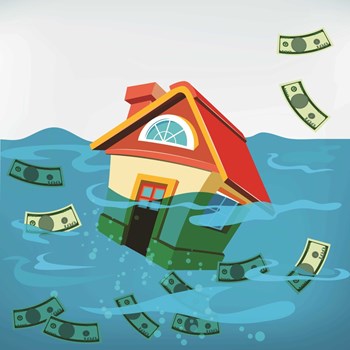
In the tough environment that has characterized both the national and world economy over the past few years, many condo owners have faced job loss, reduced salaries, or just financial uncertainty. While the situation has made things extraordinarily uncomfortable for individuals and their families, it has also had a ripple effect on the buildings and HOAs these individuals call home—particularly when owners don't pay their assessments or common charges.
Tough Times
“Unfortunately, in our current economic climate the volume of delinquencies, foreclosures and bankruptcies causes cash flow to be a burden at times. Bills still have to be paid and the main source of income to any association is the assessment dollars,” says Andrea Sorgani, former president of the Illinois chapter of the Community Associations Institute (CAI-IL) and owner of Alma Property Management in Schaumburg. “I strongly recommend that when preparing an annual budget a line item for bad debt be recognized and assessment increases adjusted to accommodate the loss of revenue.”
When unpaid, overdue debt is not collected, it can wreak havoc on a condominium association. In small communities, it can quickly cause the association to have trouble meeting operating expenses. Even larger associations will eventually feel the effects of the shortfall if multiple units fall into arrears.
First Steps
Once an owner has become delinquent, the association should take action. The first step in the process, depending on the nature and type of association, could be a friendly reminder notice as soon as the due date has passed.
“If an assessment is due on the 1st, but is not considered late until the 10th, then a simple notice to the owner on the 15th, letting them know that their payment was not received and is now subject to the late penalty, is recommended,” says James Erwin, a partner with the Chicago-based law firm, Erwin & Associates LLC. “However, once the account is 30 days late, it is recommended that the association’s legal counsel send out a 30 day notice together with an account ledger.”
Once the 30 day period has passed, if the unit remains in default and the owner has failed to enter into and adhere to a payment plan with the association, it is recommended that the board immediately authorize the filing of the forcible detainer and possession action, which will allow the association the right to possess and rent out the unit to cover assessments.
“The most successful collection policies are designed to address delinquencies in a timely and cost-efficient manner,” says Emily Jansen, J.D., supervisor of accounts receivable and collections for Vanguard Community Management in Schaumburg. “For us, a typical policy would be for account delinquencies to be addressed at 30 days, 45 days, and 60 days. After a final demand is made for payment, an account may be turned over to an attorney.”
Once an owner’s delinquency has been turned over to counsel, it is not uncommon for payment arrangements to be entered into after a “demand for possession” letter is sent by the attorney.
Erwin says that at his firm, a letter yields a high rate of collection success for their clients and believes that to be the likely case in most instances where lawyers versed in association law is used for these purposes.
“It’s vital for boards and managers to take a proactive role in collecting common charge arrears to ensure that their condominium associations remain financially stable,” he says. “Additionally, we recommend having an attorney involved in the collection process because, often, intra-personal relationships between board members and the delinquent unit owner can interfere with the board’s obligation to pursue the delinquent balance.”
While the legal fees are a bit more, they are still more than manageable and this step normally has much better results.
Once courts get involved, the legal fees start to be significant. Expenses include a title search, preparation of a summons, a court filing fee, attorney fees and an appraisal. That can easily be $1,200 to $2,500. The end result if the bank does not intercede on behalf of the homeowner will be a foreclosure auction.
“Those that are in deep will not respond to any letter. The threat of foreclosure seems to work on those persons who have a means of getting out of the hole,” Sorgani says. “If the owner has no means of getting out of the hole, threat of foreclosure, unfortunately does not make much difference.”
Liens & Foreclosures
An association’s best method for convincing the delinquent payer to settle his or her collect common charge arrears is filing a lien against the unit and foreclosing on it. Once filed, the lien will protect the condo by blocking the unit owner from selling or refinancing their unit without first paying off his or her arrears to the condo association.
“Once a delinquent account is turned over to an attorney it is necessary for a title search to be conducted to ensure the demand for possession, also known as a 30 day notice, is sent to the proper parties,” Jansen says. “If the owner has failed to make payment after the 30 day notice expires, a lien is recorded with the county recorder and a forcible entry and detainer (eviction) action can be filed.”
When a condominium's lien is filed, the condominium becomes a secured creditor under the Federal Bankruptcy Code so if the delinquent unit owner files for bankruptcy, the condominium will ultimately get a higher percentage of the debt paid as a secured creditor than if it didn't file a lien.
Under the forcible entry and detainer act (735 ILCS 5/9 104.1) (from Ch. 110, par. 9-104.1) in the State of Illinois, an association can file for possession of the unit.
“This means that the association through a court order is given the possession of the unit; not the ownership,” Sorgani says. “The association can rent the unit until all amounts due the association are recovered. Once the association has been made whole of the debt the unit is then returned to the owner of record, by court order.”
By force of the Illinois Condominium Property Act, condominium associations enjoy a statutorily imposed lien without any further action. Therefore, even if the association were to not file a specific lien for unpaid assessments, this does not mean that the lien does not exist.
“However, for purposes of providing more readily obvious notice to third parties that may not be aware of the statutory nature of the association’s lien, we recommend that our clients file a lien for unpaid assessments once the unit owner is in default, particularly if the association does not elect to proceed with a forcible detainer and possession action,” Erwin says. “It’s important to keep in mind that the filing of such a lien does not ‘protect’ the association from a foreclosure.”
According to Erwin, there is a critical distinction between a foreclosure action (which is taken by a secured lender) and a possession action (taken by an association). Ownership rights under possession are not taken away, he notes.
If the owner has rented the unit out to a tenant, then the association can collect the rent directly from the tenant via a turnover order within the forcible detainer action against the unit owner, or evict the tenant and install their own tenant. For this reason, it is important that associations remain vigilant about obtaining and maintaining the identity of the tenants as they need to be named in the forcible detainer action.
Cause & Effect
Even the best run condos will most likely face this issue eventually and they should develop a plan to make up for the potential for missing money.
“It is important to have a consistent collections policy to ensure an association is addressing all delinquencies in a timely manner,” Jansen says. “When an appropriate collections policy is in place, costs of collection can be limited and financial losses can be minimized.”
The ultimate ramifications of multiple unit owners skipping payments vary by association. In any case it will lead to unfavorable consequences which may include increased assessments to cover the deficit; dwindling reserves limiting the ability to pay for repair and maintenance driving down property values; and termination of common area services, utilities, etc.
Other effects of non-payers are that the association may need to stop non-essential services like landscaping, painting or even shut down a pool if the arrears situation gets out of hand.
“Unless the association has an adequate operating/contingency reserve fund there could be difficulty in paying bills on time,” Sorgani says. “Normal preventative maintenance projects such as painting and seal-coating could be either delayed or postponed until the next year. Major projects such as roof shingle replacement, concrete replacement, interior hall carpet replacement, etc., will be postponed indefinitely until there are funds.”
Furthermore, the opportunity for securing a loan becomes less of an option due to the financial decline of the association.
FDCPA & Confidentiality
The Fair Debt Collection Practices Act (FDCPA) is a federal law designed to protect consumers from unfair and illegal collection actions. It places certain disclosure and response obligations on entities that are retained to collect the debt of others.
“For instance, the communications to the debtor must make very clear that it is an attempt to collect a debt, must clearly disclose the name of the original creditor and the amount owed, and must advise of certain debtor rights,” Erwin says. “In the case of condominium associations, if a board member issues a collection notice to the defaulting unit owner, the FDCPA would not apply and neither the association nor the board member could be held responsible for failure to comply with its requirements. However, if the notice is sent by a third party other than the property manager, i.e. legal counsel, it should be FDCPA-compliant.”
Legally, it’s common property but ethically, it’s private information, so revealing to others that someone is late with their payments is a judgment call on the part of the association.
Keep in mind, that a condo association expecting a certain level of collection to run its budget and the money does not come in, things can get problematic in a hurry. That’s why an aggressive collection policy is important to keep disasters from happening.
Keith Loria is a freelance writer and a frequent contributor to The Chicagoland Cooperator.






Leave a Comment